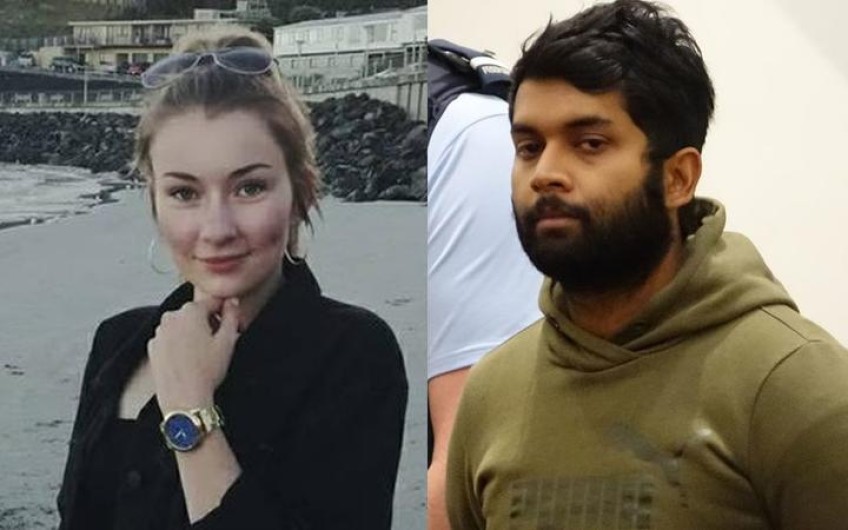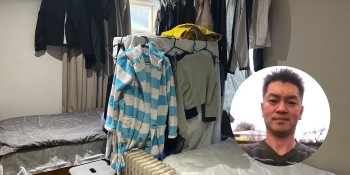Former doctor jailed for at least 19 years for murder of Amber-Rose Rush

Former doctor Venod Skantha has been sentenced to at least 19 years behind bars for the murder of 16-year-old Amber-Rose Rush.
The 32-year-old stabbed the teenager to death in her bed shortly before midnight on 2 February 2018. She was found by her mother the following morning.
Skantha will not be eligible for parole until 2037.
Justice Gerald Nation sentenced Skantha to one year for each count of threatening to kill charges - terms which would be served concurrently.
Justice Nation told Skantha he accepted the Crown's submission that he killed the teenager to "silence her" and prevent her from coming forward with her career-ending claims.
The murder was callous and carried out after illegally entering her home, Justice Nation said.
"Amber-Rose was killed in bed in her home. She was in a place she should have been able to feel most safe," he said.
Skantha's lawyer Jonathan Eaton QC has indicated the 32-year-old maintains his innocence and will appeal his convictions.
Skantha laid the blame on his teenage friend, the prosecution's key witness.
Former doctor Venod Skantha at his sentencing today. Photo: RNZ / Tim Brown
Amber-Rose's brother Jayden Rush read a statement from his deceased mother Lisa Ann Rush.
The murder had left her mother "completely broken, completely empty", Rush said.
"I constantly wish that I wasn't here and that I was with Amber," the statement said.
Lisa Ann Rush died a few months after her daughter's death in a suspected suicide.
Skantha killed the 16-year-old to stop her coming forward with claims he was showing up to work drunk, plying minors with alcohol, molesting teenagers and young women and offering money for sex.
At the end of a three-week High Court trial last November it took a High Court jury just three hours to unanimously find Skantha guilty of murder.
He was also found guilty of four counts of threatening to kill the prosecution's key witness - a teenager with name suppression - and his family relating to an attempt to cover up the circumstances surrounding Rush's death.
Venod Skantha at an earlier court appearance. Photo: RNZ / Tim Brown
At the trial the court heard Skantha's life was crumbling around him.
His job as junior doctor at Dunedin Hospital was on thin ice after he showed up to work in July 2017, while off-duty and after drinking, and treated a patient - flushing the woman's IV line in the company of friends.
He only saved his employment on that occasion by lying about the death of his mother.
On 2 February 2018 Skantha and Rush shared a terse exchange via a social media messaging app.
At 7.43pm she told him: "You're lucky I don't go into the hospital and tell them how you turn up to work drunk, supply minors with alcohol, touch them up without consent, grow up Vinny you're 30 for f***'s sake".
"I'm going to make sure everyone knows what a sick c*** you are including your work and the police."
When he questioned whether she was serious, Rush replied: "Best believe I am. I'm doing the world a favour people like you don't deserve to walk freely".
The heated back-and-forth was the result of an incident about a month earlier when Skanta sexually assaulted the young girl.
Rush told friends she fell asleep on the couch at Skantha's Duxford Crescent home and awoke to find his hand down her pants, and her bra and top removed.
She was not the only one to report such encounters with Skantha. The court was told other young women had been indecently assaulted while asleep or unconscious.
Friends of the 16-year-old told the trial Skantha's interest in her was "creepy" and he had offered up to $20,000 to have sex with her.
Amber-Rose Rush cut contact with Skantha following what happened in early January, marking the end of a friendship which had started in mid-2017 and was punctuated by boozy nights.
The teenager's last message to Skantha on 2 February 2018 - sent about 11.25pm - read: "you know what you were doing when you did it. For that you deserve everything you're gonna get".
Soon after, he picked up a mutual teenage friend and asked the boy for directions to Rush's bedroom.
Dressed in dark clothing and wearing gloves, Skantha entered the teenager's Clermiston Avenue home using a spare key kept under a Buddha statue outside the front door.
Skantha severed Rush's carotid artery and caused damage to her spine and windpipe with a single blow of a kitchen knife from his home.
"The nature of that wound indicates that the person who did that knew what was required, knew what he's doing," Crown prosecutor Robin Bates told the jury.
"The killer knew that's where you target somebody. That's the sort of knowledge Dr Skantha has from his training as a doctor."
There was no evidence of a struggle, but Skantha stabbed and sliced the victim several more times.
He took Rush's cellphone fearing the incriminating conversations about his behaviour could still lead to his career being destroyed.
But Skantha accidentally activated its camera function just after midnight as he attempted to break it while on the street outside her home.
He disposed of it in a swamp at Blackhead Quarry in the hope of deleting the exchanges between the pair.
It did not work.
The phone was found, reconstructed and its data recovered - including the images taken accidentally by Skantha.
Two days after Rush's death, Skantha met with her grieving mother and after questioning whether the death was suicide, he offered up her mother's partner as a suspect.
Rush's mother died in a suspected suicide just a few months after her daughter's murder.
When Skantha was questioned by police later on 4 February, he accused his teenage friend. However, the interviewing detective arrested Skantha about 45 minutes into the interview.






















